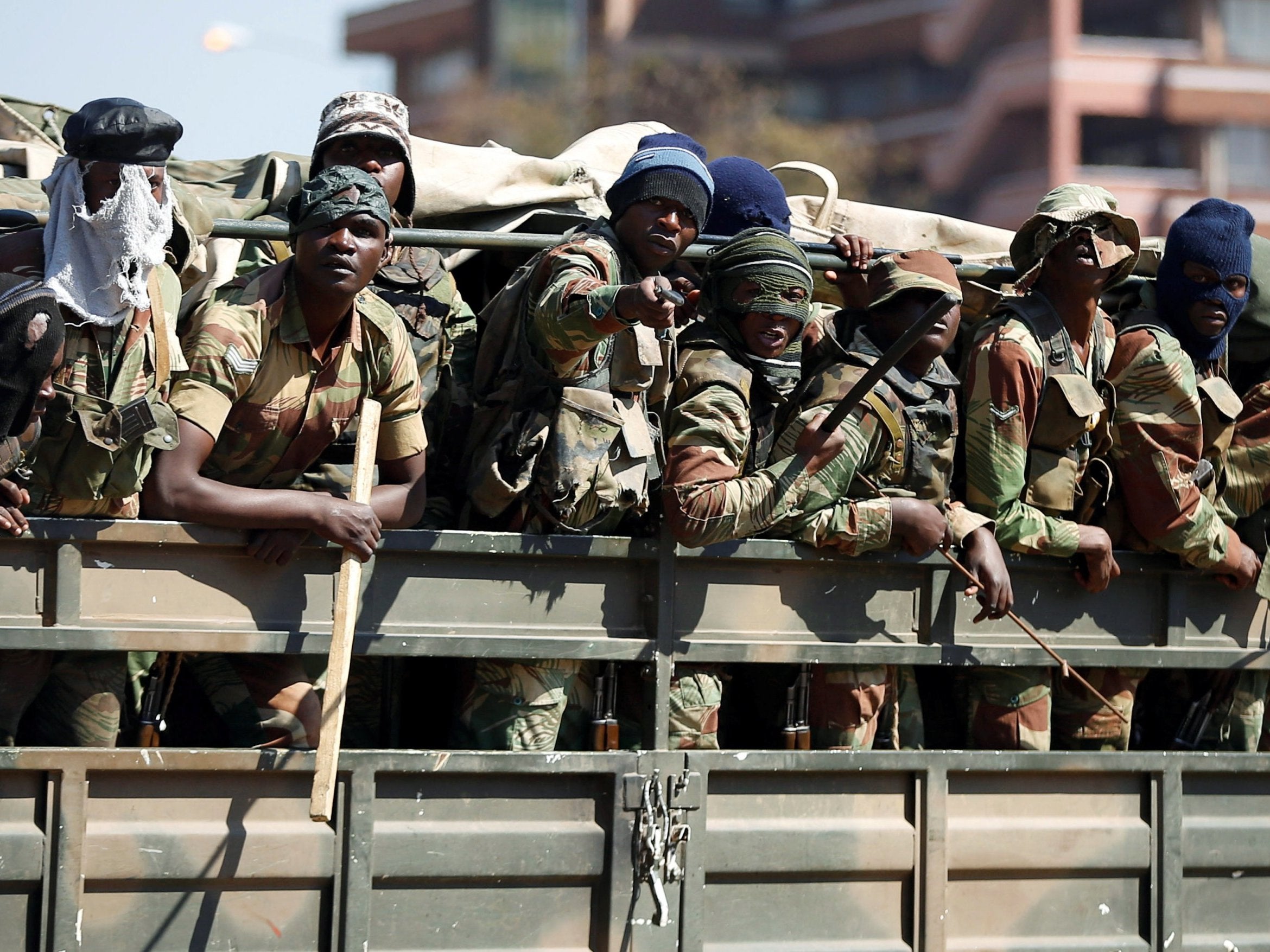Zimbabwe elections: Soldiers patrol streets of Harare after army uses deadly force to break up protests
At least three killed when troops opened fire on people protesting alleged fraud in the vote
Your support helps us to tell the story
From reproductive rights to climate change to Big Tech, The Independent is on the ground when the story is developing. Whether it's investigating the financials of Elon Musk's pro-Trump PAC or producing our latest documentary, 'The A Word', which shines a light on the American women fighting for reproductive rights, we know how important it is to parse out the facts from the messaging.
At such a critical moment in US history, we need reporters on the ground. Your donation allows us to keep sending journalists to speak to both sides of the story.
The Independent is trusted by Americans across the entire political spectrum. And unlike many other quality news outlets, we choose not to lock Americans out of our reporting and analysis with paywalls. We believe quality journalism should be available to everyone, paid for by those who can afford it.
Your support makes all the difference.Zimbabwe's army has been condemned by Commonwealth Observers for its deadly use of force to break up protesters in the capital, Harare.
At least three people were killed when troops opened fire during clashes on the streets following the early results of the country's first election since Robert Mugabe was deposed in a coup in November 2017.
The army also beat up opposition demonstrators, many of whom were throwing rocks and setting fires to protest alleged fraud in the election on Monday.
Opposition supporters claimed the country’s presidential election had been rigged by the ruling party.
Reporting from the streets of Harare, The Independent‘s Kim Sengupta described “running battles” where “troops opened fire on rioting opposition supporters, tanks took to the streets and military helicopters flew overhead”.
He wrote: “Initial exchanges saw bottles and rocks flung from the crowd and police responding with tear gas, baton rounds and water cannons. The confrontation suddenly escalated with the appearance machine-gun mounted armoured personnel carriers (APCs). Troops streamed out of the vehicles into the crowd to, at first, use their rifle butts to hit people, and then open fire.
“Some military officers claimed later that they had shot back in self-defence after coming under fire. There were sounds of some single shots, but most of it appeared to be staccato controlled bursts of semi-automatic rounds from assault rifles. Road blocks began to be put up shortly after the gunfire, tanks and APCs positioned themselves in Harare city centre.”
Zimbabwe’s president, Emmerson Mnangagwa, said he had been talking to the leader of the opposition MDC Alliance, Nelson Chamisa, to try to defuse the tension.
The violence erupted after the Zimbabwe Electoral Commission said the ruling Zanu-PF party won a majority in parliament.
There was no response from Mr Chamisa, who claimed several times on Twitter to have “won the popular vote” but gave no numbers or concrete evidence of fraud by Zanu-PF.
Observers from the Commonwealth, a group of mainly former British colonies Mr Mangagwa had been hoping to rejoin, did not hold back in criticising the military crackdown.
“We categorically denounce the excessive use of force against unarmed civilians,” Ghana’s former president, John Mahama, said in a statement on behalf of the Commonwealth.
Britain also said it was deeply concerned by the situation, while the United Nations had earlier called for restraint from all sides in the aftermath of the election.
The Commonwealth also urged the Zimbabwe Electoral Commission to expedite the announcement of the results of the presidential vote. On Wednesday, the observers had reported a number of problems with the poll, including voter intimidation.
However, China, an important source of funding under Mr Mugabe and Mr Mnangagwa, said it believed the election had generally proceeded in an orderly fashion, though a foreign ministry spokesman “noted” reports of violence on Wednesday.
On Thursday morning, the streets of Harare were calm as soldiers on foot and in trucks moved around, instructing vendors and other people to leave the city centre by noon.
Shops were shut and the streets were strewn with rocks and embers from the fires set by demonstrators.

There was a heavy police presence around the headquarters of the opposition Movement for Democratic Change party, which had sought to dislodge the ruling party at the polls after decades of rule by the dictator Robert Mugabe.
The website of the election commission, which is expected to start announcing presidential election results on Thursday, was offline after being taken out by unidentified hackers overnight.
The military deployment was the first time soldiers had appeared on the streets of the capital since the military coup during the ousting of Mr Mugabe in November, when they were welcomed as liberators.

The deployment of soldiers and their shooting and beating of unarmed protesters is likely to set back efforts to end the pariah status Zimbabwe acquired in the latter half of Mr Mugabe’s nearly four decades in charge.
It is also likely to confirm suspicions that the generals who ousted the 94-year-old - including Constantino Chiwenga, an army chief who became vice president – remain the pre-eminent political force
Additional reporting by agencies

Join our commenting forum
Join thought-provoking conversations, follow other Independent readers and see their replies
Comments